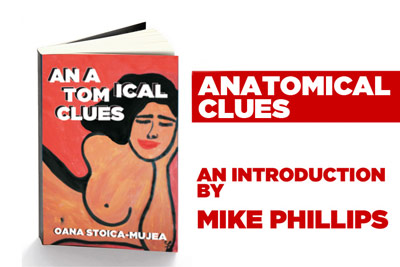 |
Mike Phillips, editor of the Profusion Crime Series, introduces a funny, intelligent and paradoxical read, which takes a scalpel to the quivering body of Romanian society. |
Anatomical Clues is exceptional in a number of different ways. To begin with the novel is centred around a woman who must be the most eccentric detective in the genre. Iolanda, or Lala to her friends, is crippled by agoraphobia, deeply insecure and astonishingly conceited.
At the same time, she represents a new and challenging voice in the Romanian public arena. Romania remains a firmly patriarchal society, the popular image of the ideal women is closely tied up with that of the mother and housewife, and apart from the obligatory opera singer, female role models in Romania are few and far between.
Underlying the plot of the novel and the character of Lala is a straightforward attack on the position of women in her environment:
“I could already picture how everybody would be staring at me, turning their heads and whispering behind me. Not that it would have been something new. They always whispered about me. Aged twenty-two, I had been recruited to the Vice squad directly from the academy, then I became – suspiciously to the mediocre mind – one of the best detectives within the Criminology department. Too young, too beautiful, too blonde. I must have passed through some beds. But this is how people with small brains think. Not that I would suspect my colleagues of possessing any brains at all.”
Unlike most of her contemporaries, Lala does not set out to pin all the problems she encounters on the dictatorship. Like the author, she was a child when Ceaușescu was deposed, and the issues she faces are not about state oppression. Instead, she is concerned with the routine discrimination which surrounds and limits the world of her peers.
Ironically, the major protagonists in the novel are based on real people, using their real names and real characteristics. The male character at the centre of the plot is Bogdan Hrib, who, in real life, also happens to be a fellow novelist and her publisher.
Partly as a consequence Anatomical Clues is also a relentless satire, on routine business practices, on the treatment of mental illness, and on the role women play in the world of Romanian arts and culture.
Running parallel to all this is Lala’s own story about the unforgiving bitterness of her relationship with her mother, and by implication, with previous generations of women. In that sense she is conscious of representing a decisive break with the traditional self image of women in Romanian society. She can’t cook, she refuses to be charming, and she makes a fetish of being inhospitable. In a society of groups, networks and collectives, she is an individual.
Lala’s use of language develops this theme. Her idiom is not “about” the way that other people speak. Instead, she uses words to distance herself from various expectations.
“I like Bucharest though, precisely because people curse each other, and, for my part, I like to reply with one of those really vicious expressions, because I enjoy seeing the effect of it on their faces.
‘What? How can a young lady who is so beautiful curse in such a disgusting way?’
‘Go stick it in your mother, you jumped-up cretin!’
Here endeth the lesson.”
Equally, in her use of foreign words, she asserts her cosmopolitan aspirations and brandishes defiance of nationalist stereotypes.
“‘Rili?’ – please note that I am using an American expression, but pronouncing it like a Romanian. So that I won’t to be accused of I don’t know what...”
Anatomical Clues is a funny, intelligent and paradoxical read, which takes a scalpel to the quivering body of Romanian society, and, in the process, explores some crucial developments of the European future.
Mike Phillips